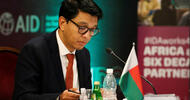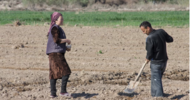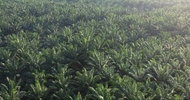While certain provisions in contracts can contain sensitive commercial information that may require a level of confidentiality, it does not justify keeping all information about large-scale agricultural projects outside the public domain.
The seizing of the poor farmers' land is destroying their only hope of survival on earth.
- Modern Ghana
-
27 December 2010
"Today, the Oromo issue is not hidden from the world leaders and stakeholders. However, it is being ignored. The Meles regime is selling Oromo land on world market, although this government does not have the right to sell Oromo land."
- Gadaa.com
-
25 February 2010
Developed nations attempt to secure supplies of food and biofuels to mitigate the impacts of climate change on the food and energy security of their populations, Khadija Sharife writes in this week’s Pambazuka News
- Pambazuka
-
26 November 2009
I wonder why the people (and more importantly the political leaders and elite) of the African and Latin American countries are not opposing and driving these companies out from within their national borders. The reason is simple. The rich and elite of every country is the real beneficiary of the process of globalisation.
- Ground Reality
-
26 June 2009
Abdullah Alireza, the Saudi minister of Commerce and Industry, talked about farming abroad in a recent visit to Seattle, where he addressed a private gathering of local business people.
- Seattle Times
-
01 June 2009
Sudan wants to expand agricultural production and investments, which could benefit it as well as Egypt, but Cairo worries that such a development might threaten its supply of the Nile's water.
- AL-Monitor
-
02 November 2017
Locals say land grabbing is on the rise because of the Lamu Port South Sudan-Ethiopia Transport corridor.
- The Star
-
27 November 2014
There are countless examples of governments handing it over at bargain prices to foreign investors, ranging from hedge funds to biofuel producers.
Researchers find that bulk of deals to lease out land are struck in 32 of the countries ranked “alarming” or “serious” on the Global Hunger Index score.
A move by Madagascar's army-backed leader to nix a huge South Korean farming deal has exposed the risks of such ventures in Africa.
A two-day Experts’ Group Meeting to validate the Communications and Advocacy Strategy for the Land Policy Initiative was held 21-22 Aug in Addis Ababa, Ethiopia.
- African Union
-
21 August 2014
A new report by the International Institute for Environment and Development about large-scale land deals in Ethiopia states that allocating land to investors has not shown a lot of benefits.
The 2-minute animation 'There You Go!' shows how 'development' can rob self-sufficient tribal people of their land, livelihood and pride, and turn them into beggars.
- Survival International
-
03 February 2014
BBC radio investigates report by Human Rights Watch that claims Britain is indirectly funding a brutally enforced resettlement programme in Ethiopia.
Foreign investors see Africa as a breadbasket. Done well, investment could help with African hunger but create food security for the rest of the world.
- CSMonitor
-
06 February 2011
The EAC food security strategy advises partner states to “resist leasing or selling large chunks of land to foreign entities for food production or bio-fuels solely for export.”
- East African
-
04 October 2010
Al Amoudi has a new company whose purpose is to grow food in Ethiopia for Saudi Arabia.
- Addis Fortune
-
12 October 2009
The problem is that we will lose control. Of course, some regulatory framework will be put in place, but it will also include ceding of control over our land resource to foreigners for a yet-to-be-specified time period.
- Business Recorder
-
10 September 2009
The initial welcome given to rich countries’ investment in African farmland by agricultural and development officials has faded as the first ventures prove to be heavily weighted in favour of the investors. The FAO warned of such a trend when it said this year that the race to secure farmland overseas risked creating a “neo-colonial” system.
- Financial Times
-
20 November 2008
Activists from six countries as well as the UN Special Rapporteur on the rights of Indigenous Peoples joined a recent Terra Madre Forum on land grabbing, “Take Your Hands Off The Earth”.
- Slow Food
-
28 September 2016
World Bank and China join Ethiopia's government to relocate 200,000 villagers of the Omo River and Lake Turkana Valley to replace them with super-irrigation plantations.
- Digital Journal
-
24 February 2015
The distinctive feature of these land deals that has attracted attention is the speed of the acquisitions, the transparency (lack thereof) of the terms and the scale of the acquisitions and implied investment.
Chief Minister of Madhya Pradesh's meetings with a delegation from Kenya, Karuturi and Ethiopia were focused on agriculture development and possible areas of work for mutual benefit.
- ZeeNews
-
17 September 2011
Nirmal Seeds wants not more than 30,000 hectares of land in Tanzania to invest in seeds production to feed the local market.
- Tanzania Daily News
-
22 August 2011
Wealthy U.S. and European investors are accumulating large swaths of African agricultural lands in deals that have little accountability and give them greater control over food supply for the world's poor
“I got in on the ground floor, others got in on the second floor, but there’s a lot of floors left to go in Africa’s economic cycle,” says farmland investor Sai Karuturi.
- Bloomberg
-
24 October 2010
Studies suggest that a third of the land sold or acquired in Africa is intended for fuel crops - some 5 million hectares. Friends of the Earth has looked at cases of land grabbing in 11 countries across Africa, from Ethiopia to Mozambique
Al-Amoudi's recently established Saudi Star Agricultural Development Plc requested, two weeks ago, an additional 250,000 ha of land in Ethiopia for sugar beet production.
- Addis Fortune
-
07 December 2009
"We decided to update a previous feasibility study due to the fact that the prices of food items that will potentially be grown on the project's lands, including fodder and grains, have changed drastically over the past year," Jordan's Agriculture Ministry Secretary General Radhi Tarawneh said
- Jordan Times
-
16 November 2009















